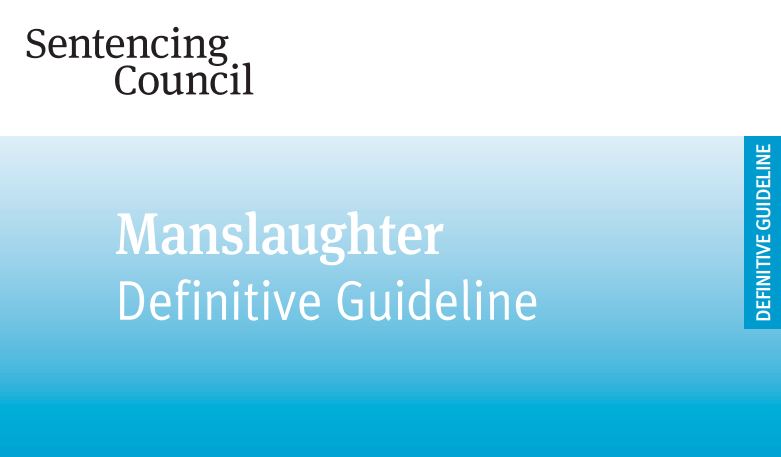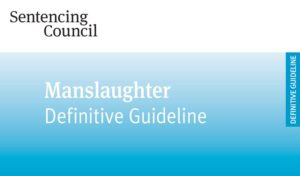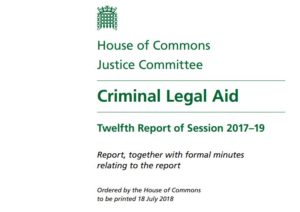Monthly Archives: July 2018
The Sentencing Council, responsible for setting sentencing guidelines in England and Wales, has today issued a new sentencing guidelines for manslaughter offences.
Which offences are covered by the new sentencing guidelines for manslaughter offences?
The guideline covers:
- Unlawful act manslaughter – a common law offence
- Gross negligence manslaughter – a common law offence
- Manslaughter by reason of loss of control – a statutory partial defence to murder (sections 54 and 55 of the Coroners and Justice Act 2009)
- Manslaughter by reason of diminished responsibility – a statutory partial defence to murder (section 2 of the Homicide Act 1957)
The offence of corporate manslaughter is covered by the Council’s health and safety sentencing guidelines.
When does the guideline take effect?
The sentencing guideline for manslaughter offences applies to all offenders sentenced on or after 1 November 2018. This means that if you are charged before the guideline comes in to force, you may still fall to be sentenced in accordance with it if you plead guilty or are convicted.
What are the different types of manslaughter?
Unlawful Act manslaughter
This is the most commonly prosecuted form of manslaughter and includes deaths that result from assaults where there was no intention to kill or cause very serious harm. The circumstances can vary greatly.
For example, it could involve a situation where two friends briefly argue and one pushes the other causing him to fall and hit his head with fatal results.
Alternatively, it could involve someone going out looking for a fight and attacking someone forcefully but not intending to kill.
It could also include unintended deaths that result from other crimes, such as arson or robbery.
105 offenders were sentenced for this offence in 2016.
Gross negligence manslaughter
This occurs when the offender is in breach of a duty of care towards the victim which causes the death of the victim and amounts to a criminal act or omission.
The circumstances can again vary greatly. In a domestic setting it could include parents or carers who fail to protect a child from an obvious danger. In a work setting, it could cover employers who completely disregard the safety of employees.
Just 10 offenders were sentenced for this offence in 2016.
Manslaughter by reason of loss of control
This arises if the actions of an offender, who would otherwise be guilty of murder, resulted from a loss of self control. An example might be where there was a fear of serious violence.
12 offenders were sentenced for this offence in 2016.
Manslaughter by reason of diminished responsibility
Someone guilty of this offence would have been suffering from a recognised mental condition that affected their responsibility at the time of the offence, without which they would have been convicted of murder.
26 offenders were sentenced for this offence in 2016.
Why has this guideline been issued?
The new sentencing guidelines for manslaughter offences will ensure there is comprehensive guidance where previously such guidance was very limited.
Until now, there has been a guideline only for corporate manslaughter, which comes under the Council’s health and safety offences guideline. The only other guideline was issued by the Council’s predecessor body for manslaughter by reason of provocation. This is now out of date following legislative changes to the partial defences to murder.
The full guideline can be found here:
Manslaughter Definitive Guideline
Will sentence length increase?
The Sentencing Council predicts only a minimal impact, suggesting that only around ten extra prison places will be needed per year as a result of the guideline. It cautions, however, that ‘it is difficult to ascertain how sentence levels may change under the new guideline.’
Experience tells us that there is a certain degree of sentence length ‘creep’ following the implementation of new guidelines. Our advocates are trained in the use of all sentencing guidelines and equipped to ensure that judges apply them correctly.
Contact a criminal law specialist
As the new sentencing guidelines for manslaughter offences show, manslaughter will always be treated seriously by the courts. The issues that arise in the defence of such cases will be complex.
As a result, if you are arrested or know that the police wish to speak to you about an offence of manslaughter then make sure you insist on your right to free and independent legal advice.
The advantages of such early advice legal advice can be found here.
If you have already been interviewed or face court proceedings we can still make a real difference to the outcome of your case. Legal aid may well be available to fund your defence at court.
We have offices across the East Midlands. You can find your most convenient office here. Alternatively you can contact us using the form below.
Contact
Monthly Archives: July 2018
Many in the medical profession have been up in arms following the recent High Court decision involving Dr Bawa-Garba (General Medical Council v Bawa-Garba [2018] EWHC 76 (Admin), overturning the decision of the Medical Practitioners Tribunal.
 The case had followed on from proceedings before the Medical Practitioners Tribunal which had ruled that Bawa-Garba should be suspended from practice for a period of one-year. That ruling was challenged by the General Medical Council, resulting in Bawa-Garba being erased from the medical register, which brought to an end her right to practice medicine.
The case had followed on from proceedings before the Medical Practitioners Tribunal which had ruled that Bawa-Garba should be suspended from practice for a period of one-year. That ruling was challenged by the General Medical Council, resulting in Bawa-Garba being erased from the medical register, which brought to an end her right to practice medicine.
The High Court observed that it reached ‘this conclusion with sadness but no real hesitation’.
Medical Practitioners Tribunal Decision Appealed
On appeal against this decision, the Court of Appeal has heard her removal for a “one-off mistake” had robbed the NHS of a “young and talented” doctor. The original decision to suspend rather than dismiss the doctor was argued to be “humane and balanced”, whereas the GMC have argued that “any other sanction undermined its rules and her manslaughter conviction.”
So, what is the background to this unhappy story?
In November 2015 Bawa-Garba was convicted at Nottingham Crown Court for an offence of manslaughter by gross negligence. She was sentenced to two years imprisonment, which was suspended.
This conviction came about due to her negligent care of a six-year-old boy, who died. An appeal against conviction in December 2016 failed.
In the later High Court proceedings, it was observed that ‘her failings on that day were “truly exceptionally bad” and that this must be reflected in the sanction.
So, why did the Medical Practitioners Tribunal (MPT) only order a suspension?
When the MPT heard the case, it had the benefit of hearing a substantial body of evidence about the pressures placed on Dr Bawa-Garba and the failings of others. In essence counsel for the GMC submitted that the Tribunal had in effect allowed evidence of systemic failings to undermine Dr Bawa-Garba’s personal culpability, and to do so even though those failings had been before the Crown Court which convicted her.
The Tribunal had therefore decided to find the Doctor less culpable than the jury had as a matter of law, and for that reason, the decision could not stand.
The High Court observed:
“The day brought its unexpected workload, and strains and stresses caused by IT failings, consultant absences and her return from maternity leave. But there was no suggestion that her training in diagnosis of sepsis, or in testing potential diagnoses had been deficient, or that she was unaware of her obligations to assess for herself shortcomings or rustiness in her skills, and to seek assistance.
There was no suggestion, unwelcome and stressful though the failings around her were, and with the workload she had that this was something she had not been trained to cope with or was something wholly out of the ordinary for a Year 6 trainee, not far off consultancy, to have to cope with, without making such serious errors. It was her failings which were truly exceptionally bad.”
A crowd-funding campaign to assist Dr Bawa-Garba was set up. One of the doctors behind the crowdfunding campaign, Dr Moosa Qureshi, said:
”There needs to be greater transparency as to why these decisions were made and who made them. Many of us feel that Dr Bawa-Garba was unfairly discriminated against and scapegoated for multiple system failings that could easily have happened to any of us in the current political crisis of the NHS. We want patients to be protected and for this doctors need to be able to look after patients without fear that they will be blamed or worse struck off when working in unsafe and dangerous conditions.’
So, many believe that Bawa-Garba has been made a scapegoat for systemic failings in the NHS.
In a further twist to this story, the previous Health Secretary Jeremy Hunt ordered a review into criminal manslaughter so far as it affects medical practitioners. The health secretary stated that clarity was needed about drawing the line between gross negligence and ordinary errors, and that ‘Doctors should learn from – not fear – mistakes.’
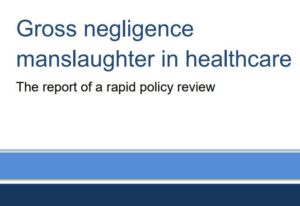 The review, led by Sir Norman Williams (a former President of the Royal College of Surgeons), reported in June 2018. In the introduction to the report, Sir Norman wrote:
The review, led by Sir Norman Williams (a former President of the Royal College of Surgeons), reported in June 2018. In the introduction to the report, Sir Norman wrote:
“We hope our recommendations will change the environment by establishing a just culture and providing reassurance to healthcare professionals, patients and their families that gross negligence manslaughter cases will be dealt with in a fair and compassionate
manner.”
The full report can be found here.
By any measure this is a sad case for all concerned and criminal practitioners will be keeping a watchful eye on the outcome of the Court of Appeal case.
Contact a crime and regulatory law specialist

If you are a professional person facing criminal proceedings then please contact our criminal and regulatory partner Martin Hadley immediately.
Martin will be able to provide free and independent legal advice in police interview.
If charged, we will provided affordable representation before either the Magistrates’ or Crown Court, and be able to provide advice with an eye to any future potential disciplinary proceedings such as those before the Medical Practitioners Tribunal.
Contact
Monthly Archives: July 2018
Extradition is the formal process where one country asks another to return a person to stand trial or to serve a sentence. Under multilateral conventions and bilateral extradition treaties, the UK has extradition relations with over 100 territories around the world.
What Is the Process?
The requesting State contacts the UK authorities and makes an extradition request. This may result in a warrant being issued against you, and court proceedings commenced.
It might be the case that you fear an extradition request will be made in the future – if so, you should contact us without delay so that we can advise on the options available.
Save in very exceptional circumstances your case will be heard before a District Judge sitting at Westminster Magistrates’ Court in London.
Once formalities are dealt with, the court will consider whether the tests for extradition are met. In some cases, the final decision will rest with the Home Secretary.
In some instances, a case can be disposed of very quickly, in others, it will involve a contested hearing.
The exact process will depend on which extradition regime is being applied, as it varies between requesting States.
Do I Need a Solicitor?
Yes, is the simple answer. Extradition Law is incredibly complex, and there are no circumstances where it is appropriate to try and navigate your way through this legal maze.
A duty solicitor will be available at Court to assist you, but even at that stage, you can insist that we are contacted to help – the earlier we are instructed in the proceedings, the better equipped we will be to assist you.
In some cases, it will be appropriate to use specially trained counsel (barristers) who specialise in extradition law.
Experienced extradition lawyers can advise you on the processes and how an extradition request might be opposed.
Bars to Extradition
- rule against double jeopardy
- the absence of a prosecution decision (whether the prosecution case against the accused is sufficiently advanced)
- extraneous considerations (whether the request for extradition is improperly motivated)
- passage of time
- the requested person’s age
- speciality (the requested person must only be dealt with in the requested state for the offences for which they have been extradited)
- onward extradition (where the requested person has previously been extradited to the UK from a third county, and consent for onward extradition from that country is required but has not been forthcoming)
- forum (whether it would be more appropriate for the requested person to be prosecuted in the UK instead)
The judge must also decide if extradition would be disproportionate or would be incompatible with the requested person’s human rights (for example the right to family life is a person has been settled in this Country for some time). If the judge decides it would be both proportionate and compatible, extradition must be ordered.
Note that the process is different when the final extradition decision is to be made by the Home Secretary.
It is vital that all available evidence is presented during the hearing, and this may involve testimony from experts both in this Country and from abroad.
In a significant number of cases, further avenues of appeal are available to the High Court, and the Supreme Court.
Is Funding Available?
Legal aid may be available depending on your financial circumstances. If you are not eligible for legal aid, then we will be able to offer a privately funded package.
Leave Nothing To Chance
The prospect of being returned to another country to face legal proceedings is daunting; it is, therefore, essential that you seek out expert assistance at an early stage.
Contact
Monthly Archives: July 2018
In the UK we have not had the death penalty for over 50 years. The last hanging in England took place in 1964 when Peter Allen and Gwynne Evans were hanged for the murder of John West, 15 months before the death penalty was abolished.
Since then there has been a long-held opposition to the death penalty which has been applied in extradition cases.
What is extradition?
Extradition means legal proceedings for the return of a person in the UK to another country to face criminal proceedings (or proceedings abroad to return a person to the UK).
How is the death penalty relevant?
When the requesting country has the death penalty available, and it could apply to the criminal proceedings in question the UK would usually seek an assurance that the person will not face the death penalty if extradited. If an assurance is not given, then UK law would prohibit the removal from the UK of that person. The death penalty is forbidden under the European Convention of Human Rights.
Why is it in the news now?
Alexander Kotey and El Shafee Elsheikh are alleged to have been involved in the torture and beheading of more than 27 victims as members of a cell of Isis executioners in Syria and Iraq. They are not subject to extradition as they were not arrested in the UK.
They have been stripped of their British citizenship, and discussions have been taking place as to whether they should be returned to the UK for trial or taken to the USA. Victims have been both UK and US citizens.
In an unusual move Sajid Javid, the UK Home Secretary, told the USA that he would not seek an assurance over the use of the death penalty and agrees to the US request for mutual legal assistance. This decision is now on hold pending a legal challenge.
What is mutual legal assistance?
Mutual Legal Assistance is a method of co-operation between states for assistance in investigating or prosecuting criminal offences. The guidelines for Mutual Legal Assistance are similar to the law in extradition outlined above, in saying that if the death penalty is a possible sentence, an assurance will be sought that such a sentence will not be carried out in the event of a conviction.
What are the implications?
Commentators are questioning whether this is a relaxation of the policy of opposition to the death penalty in the UK. Javid apparently stated in his letter that this does not alter the stance of the UK, but it certainly raises questions as to whether assurances would not be sought in the future and in what circumstances.
The Howard League for Penal Reform has already indicated that it may bring legal proceedings to challenge the decision of the Home Secretary.
How can we help?
Fortunately, individuals cannot receive the death penalty in the United Kingdom. The alternative, however, is that those convicted can face very lengthy prison sentences and severe restrictions on their liberty if convicted.
We not only help those who are suspected of offences but also provide advice on all aspects of prison law for those already sentenced.
If you would like to discuss any aspect of your case please contact your nearest office or use the contact form below.
Contact
Monthly Archives: July 2018
We are all aware that we live in a surveillance society. CCTV cameras can record our movements around large towns and cities, and many homes now have them installed for protection.
Automatic Number Plate Recognition cameras take a snapshot of car number plates and can not only monitor average speed for road traffic enforcement purposes, but also track the movement of a vehicle over hundreds of miles in most instances.
 Finally, most people are aware that the location where a mobile telephone call was made can be pinpointed to within a few hundred metres.
Finally, most people are aware that the location where a mobile telephone call was made can be pinpointed to within a few hundred metres.
But who knew that an App, installed on all Apple phones, and similar Apps on Android devices, could hold the key to a murder case? One defendant in Germany, Hussein Khavari, found this out to his cost when he faced trial for the rape and murder of a 19-year-old student.
While investigators were able to piece together part of the defendant’s movements, his location at critical times was unknown. It was at this point investigators turned their attention to his phone which had been seized as evidence upon arrest.
Police examination of mobile phone data
The defendant had refused to provide the police with the PIN to unlock the phone. Despite this, specialists were able to hack into the phone and examine the mobile phone data.
 The data from the Health App was examined. It could be seen that at certain moments the data demonstrated a significant increase in physical activity. This mobile phone data correlated with important parts of the prosecution case within the timeline, namely dragging a body down a river embankment and then climbing back up.
The data from the Health App was examined. It could be seen that at certain moments the data demonstrated a significant increase in physical activity. This mobile phone data correlated with important parts of the prosecution case within the timeline, namely dragging a body down a river embankment and then climbing back up.
This evidence was used to dispute the defendant’s account of the killing which he stated was by accident, had happened at a different location, and was not premeditated.
The use of such seemingly private mobile phone data is proving controversial. This is particularly true where there is a friction between the right to privacy and the legitimate investigation of crimes.
Difficulties for investigators
Strong encryption technology is also reported to be making life very difficult for investigators. Home Secretaries has spoken many times of the need for new legislation.
This story also reminds us that encryption may only as good as the password behind it. A 4-digit code to protect a phone or other device can be cracked within minutes by a data specialist. A ten-digit random code would probably only be cracked after many years of trying, if at all.
In the UK police can, in some circumstances, request that a suspect hand over their PIN and passwords. Failure to do so can lead to prosecution for a criminal offence under section 53 Regulation of Investigatory Powers Act 200. This offence carries a prison sentence of up to 5 years.
Contact a criminal law specialist
The issue of privacy and its place in criminal justice is a new and evolving topic, as is the requirement to hand over PINs and passwords.
Before choosing to reveal your data secrets or making a decison to refuse it will be critical that you seek specialist independent advice as soon as possible,
You are likely to be asked to make this decision in police interview. Our advice will be free of charge to you in those circumstances so make sure you take advantage of it.
You can find your nearest office here.
Alternatively you can use the contact form below.
Contact
Monthly Archives: July 2018
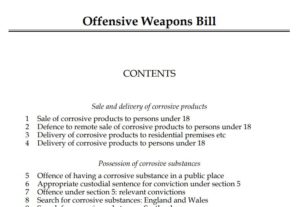 The government has published an Offensive Weapons Bill. The legislation is designed to signal a more stringent approach to the possession of weapons and liquids that can be used to cause harm, such as corrosive substances.
The government has published an Offensive Weapons Bill. The legislation is designed to signal a more stringent approach to the possession of weapons and liquids that can be used to cause harm, such as corrosive substances.
The Offensive Weapons Bill forms part of the government’s response to the recent rise in serious violence, set out in the £40m Serious Violence Strategy. This places a new focus on early intervention alongside robust law enforcement.
What is proposed in the Offensive Weapons Bill?
The following provisions feature in the bill:
- a new criminal offence of selling – both online and offline – a corrosive product to a person under the age of 18. The substances and concentration levels of what constitutes a corrosive product are set out in the Bill.
- a new criminal offence of possessing a corrosive substance in a public place. There is a defence of possessing the corrosive substance for a good reason. There is a minimum custodial sentence in England and Wales where a person is convicted for a relevant offence a second time. The offence will carry a maximum sentence of 4 years imprisonment.
- where a corrosive product or bladed product is sold online, the defence of having taken reasonable precautions can only be relied on where the seller meets certain conditions in terms of age verification and packaging and delivery of the items
- new criminal offences prohibiting the dispatch of bladed products and corrosive products sold online to a residential address. The offence for bladed products is limited to those that can cause severe injury and includes defences for made to order items and those for sporting and re-enactment purposes. The offence will carry a maximum sentence of 6 months imprisonment.
- new criminal offences in relation to delivery companies delivering a bladed article or a corrosive product on behalf of a seller outside the United Kingdom to a person under 18
- updating the definition of a flick knife and prohibition on the possession of flick knives and gravity knives (their sale etc. is already prohibited)
- amending existing law to make it a criminal offence to possess certain weapons (such as knuckledusters and death stars) – the sale and importation of these is already prohibited. It provides for compensation of owners
- extending the existing offences of possessing a bladed article or offensive weapon on school premises to cover further education premises in England and Wales and Northern Ireland
- amending the legal test for threatening with an offensive weapon in England and Wales
- prohibiting high energy and rapid firing rifles and a device known as a “bump stock” which increases the rate of fire of rifles. Existing owners will be compensated.
How we can help
Although the contents of the Offensive Weapons Bill are yet to be made law, in recent months the rhetoric around knife-crime has been ramped up by politicians seeking to respond to public concern about knife-crime.
Judges hear this and often react by imposing increasingly long prison sentences. These concerns have been reflected in the new guideline relating to sentencing those convicted of possessing offensive weapons.
It is our role to ensure that firstly our clients only enter guilty pleas when such a plea is appropriate. We will begin to prepare your defence from the very beginning of the investigation, so take advantage of our free and independent legal advice in police interview.
If you are to be sentenced for an allegation involving a weapon or a blade then we will make sure that relevant factors from the background to the offending is properly advanced in mitigation. The lives of young people in particular may be complex and some of the factors contributing to offending may be hidden.
It is our job to ensure that the full picture is presented to the court.
Alternatively you can use the contact form below:
Contact
Monthly Archives: July 2018
It would be thought that in relation to sexual offences and the issue of consent the issue should be straight forward – yes or no?
As always, life and the law are more complicated than that. The issue of consent is, unfortunately, not so simple.
What is consent?
A person consents if she or he agrees by choice and has the freedom and capacity to make that choice.
Can a drunk person give consent?
Yes, drunken consent is still consent. However, this is where problems can arise. If a person loses their capacity to choose through drink then he or she is not consenting.
Where a person is consenting is frequently the issue in many rape cases. As a result it is often one word against another.
The Courts have given the following guidance as to the issues to focus upon:
- Did sexual intercourse take place?
- Did the complainant consent to sexual intercourse?
- Did the complainant have the freedom and capacity to consent?
- Did the defendant reasonably believe that the complainant was consenting? This consideration will not apply in all cases.
Who decides?
At trial, it will be for the jury to determine issues of capacity and consent having heard all of the evidence.
How do you prove consent?
In the absence of something in writing, and even then, there could be doubts A jury will have to decide the issue having heard all of the evidence.
In some cases, it is not enough for a defendant to simply say that he or she believed the other person was consenting. There must be evidence that he or she had a reasonable belief that there was consent. This would include considering any steps taken by the defendant to ascertain the complainant was consenting.
The situation could also arise where consent is given on condition, for example, that a condom is used. If one is not used, then the “consent” may no longer provide a defence.
There have also been cases where a female has pretended to be a male and had intercourse on that basis. The defendant was guilty because the complainant said that she would not have consented if she had known that the defendant was female.
How can we help?
This article is a brief analysis of potential issues, as you can see this is an area that would require careful assessment and expert advice.
The problem with many alleged sexual offences is that they require a jury to examine intimate factual scenarios, often clouded by drink or drugs, where there is seldom any independent evidence to assist one way or the other.
It is our job to present the strongest case possible. You can read more about how we will prepare your case fro trial here.
To ensure that your defence is properly advanced from the start, you will want to take advantage of our free and independent legal advice in the police station. The advice is free to you no matter what your income. You can read about the advantages of early advice here.
Sexual offences are likely to be heard before the Crown Court. We will always advise you as to your entitlement to legal aid to ensure affordable representation at trial. You can read more about Crown Court legal aid here.
We provide nationwide representation from our offices across the East Midlands. You can find your nearest office here. Alternatively you can use the contact form below.
Monthly Archives: July 2018
A recent report from the House of Commons Justice Committee entitled “Criminal Legal Aid” has made the following observations and recommendations after hearing evidence across a wide range of issues. The conclusions are below.
Recent changes to the LGFS
- The evidence we have received suggests that solicitors have serious grievances about the Litigators’ Graduated Fee Scheme, given the absence of index linking for two decades, the 8.75% cut in fees imposed in 2014, and the recent reduction to the cap on pages of prosecution evidence.
- The Law Society’s judicial review of the Government’s decision to revise the LGFS means that it would not be appropriate for us to offer comment on the details of the scheme at this point in time. However, we have received evidence indicating a worryingly high level of demoralisation among criminal defence solicitors and threats to the economic sustainability of criminal defence firms, with negative implications for the criminal justice system—especially for defendants. We return to this issue below.
- We consider it regrettable that the Law Society has had to resort to bringing a judicial review to pursue its grievances about the LGFS. We recommend that the Ministry of Justice take urgent steps to avoid this dispute having to be resolved by the courts. Whatever the outcome of the judicial review, we consider there should be a wider review of criminal legal aid.
Recent changes to the AGFs
- We consider it regrettable that the Criminal Bar felt compelled to take direct action in response to the new Advocates’ Graduated Fee Scheme, given the potential for adverse impact on defendants and complainants, as well as on the functioning of the courts. However, the underlying reasons for the dispute can be understood, including the failure to ensure that fees keep pace with inflation, the staged fee reductions from April 2010 onwards, unhappiness about aspects of the revised AGFS and the Criminal Bar’s genuine and heartfelt concerns about the future of their profession and under-funding of the criminal justice system.
- While we welcome the Government’s decision to offer additional funding for the AGFS and the Criminal Bar’s decision to accept the offer, we do not believe that ending this specific dispute has resolved the underlying issues and it is clear that many barristers remain deeply unhappy about their situation and about the future of the criminal justice system.
- We acknowledge the challenges facing the Ministry of Justice in reworking the AGFS so that it is fair to advocates at all levels of seniority, and in ensuring that it is future-proofed against inevitable changes in the profile of Crown Court cases. We also recognise that the Ministry of Justice has made genuine efforts to address the concerns of the Criminal Bar. To provide for ongoing collaboration with the legal profession on refinements to the AGFS, we recommend that, without any further delay, a system of annual review be built into the AGFS, overseen by a panel which incorporates representatives from the Criminal Bar and solicitor organisations, Criminal Legal Aid 39 alongside Government representatives. The panel’s remit should include considering the inter-dependency between the AGFS and the LGFS, and the impact of changing the former on the operation of the latter.
Expenditure on criminal legal aid
- As we have observed, there is a common law right to legal advice, together with a right to legal representation for an accused person under Article 6 of the European Convention on Human Rights. We conclude that there is compelling evidence of the fragility of the Criminal Bar and criminal defence solicitors’ firms placing these rights at risk; we conclude that this risk can no longer be ignored.
- We also conclude that current difficulties in recruitment to the Criminal Bar could potentially have a negative impact on future recruitment to, and diversity within, the judiciary—in particular for judicial office holders in the criminal courts.
- Given these risks, we welcome the decision of the Ministry of Justice to consider legal aid for criminal law within the LASPO post-implementation review, as a first step in understanding the crisis that criminal legal aid is facing. We recommend that the output from this workstream be used to underpin a comprehensive and independent review of criminal legal aid, with the aim of devising a scheme that is sustainable and user-focussed; the review should adopt a similar approach to that of the recent independent review in Scotland. This review should be launched no later than March 2019 and should be concluded within 12 months.
Declining expenditure on the Criminal Justice System
- An effective criminal justice system which successfully prosecutes those who commit crime but which also protects the innocence of the accused unless the prosecution can prove their guilt is one of the pillars on which the rule of law is built. The effectiveness of the system also demands that the fabric of the criminal courts is properly maintained. We conclude that the under-funding of the criminal justice system in England and Wales threatens its effectiveness, and in doing so undermines the rule of law and tarnishes the reputation of the justice system as a whole.
- Our justice system is widely admired and the UK is a jurisdiction of choice for many individuals and corporate bodies that need to resolve disputes; nonetheless, it faces competition from other jurisdictions. We conclude that the under-resourcing of the criminal justice system undermines the prospects of successfully promoting our legal system abroad, a stated objective of the Government.
- We recommend that that the Government conduct an urgent cross-departmental review of funding for all elements of the criminal justice system, including criminal legal aid and the Crown Prosecution Service, with the aim of restoring resources to a level that enables the system to operate effectively; the details of this review should be published in advance and its timetable must ensure completion in time to influence the conclusions of the 2019 Spending Review.
Criminal Legal Aid Disclosure of unused material
- We conclude that the pressure placed on defence lawyers to fulfil their professional obligations by reviewing unused prosecution material without remuneration is fundamentally unfair and—with the continual increase in the amount of such material—likely to become unsustainable, and increasingly prejudicial to the defendant. We recommend that restoring legal aid payments for reviewing unused material above a certain page threshold be considered as part of the comprehensive and independent review of criminal legal aid that we have recommended above.
The link to the full justice committee report can be found here.

